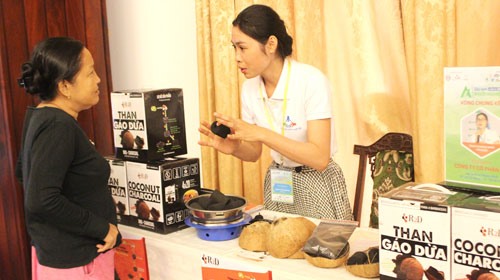 Society
Society

From discarded coconut shells, one engineer in HCM City has successfully manufactured smoke-free charcoal which is not harmful to people’s health, helping to reduce environmental pollution.
 |
| Lê Thị Hiền introduces her product to a client. – Photo danviet.vn |
HCM CITY – From discarded coconut shells, one engineer in HCM City has successfully manufactured smoke-free charcoal which is not harmful to people’s health, helping to reduce environmental pollution.
She is Lê Thị Hiền, a food technology engineer born in 1984 in the central province of Quảng Trị’s coastal Vĩnh Linh District.
After graduating from university in HCM City, Hiền started businesses dealing with coffee and starch products but failed to find success.
Throughout it all, she was concerned about the abundant discarded agricultural byproducts.
The idea to manufacture organic charcoal came to her by chance.
“Three years ago, one of my foreign business partners asked me to produce non-smoke charcoal for the Arabian market to use in smoking shisha,” she recalled.
Recognising that the opportunity was consistent with her long-held desire to use agricultural byproducts, Hiền immediately accepted the proposal and rushed into research.
"If it was made from wood, the sense of environmental protection was meaningless,” Hiền told online newspaper khoahocphattrien.vn. “We would have to destroy the forest for firewood. Moreover, my partner asked me to make organic charcoal.”
“So, I decided to look for coconut shells," she said.
The southern province of Bến Tre – home of many of the country’s coconuts – produces more than 25 million coconuts every year.
This huge scale of production means 9,000 tonnes of coconut shells are discarded every month.
Hiền realised that Bến Tre’s coconut byproducts were the perfect raw materials for producing organic charcoal.
First, Hiền had to figure out how to make the shells burn cleanly. Normally, they burn carbon and emit smoke.
Equipped with knowledge from her time in the food industry and extensive research, Hiền realised that solving the issue of coal smoke required adhesive agents.
“I used cassava starch as glue rather than using chemicals,” she said. “In addition, when burning coconut shells into charcoal, I used an anaerobic method to solve the smoke issue which badly affects the environment.”
After honing her charcoal burning technique, she started to produce it on a trial basis.
“The very first days of manufacturing the shell charcoal were a hard time,” Hiền recalled.
In 2005, Hiền drove her shoddy old motorbike around to collect coconut shells from processing plants and cafes in and around HCM City, even going as far as Bến Tre Province, 85km far from the city.
After obtaining the raw materials, she personally went to hire coal-fired kilns to burn the shells.
“Every day, I had to work with the charcoal kilns to supervise the work, and then I shaped the charcoal powder into small pieces,” she said. “On those days, I looked like a mine worker with black powder covering from me head to toe.”
After two years of research and production, Hiền was ready to present her organic charcoal.
The charcoal emits no smoke, odour, sparks, or chemical adhesive agents.
In addition to these four main advantages, her charcoal produces white, easily soluble ash perfect for grilling or smoking shisha.
Her “4 Nos” charcoal received first prize at the 3rd Agriculture Start-up Project Competition in 2017.
Market expansion
Despite this recognition, Hiền found that the new product was not readily accepted in the market because the use of wood-based charcoal and coal is a longstanding habit that could not be changed overnight.
Hiền said her group had to spend about two months doing market research and finding out which restaurants were using wood charcoal, coal and sawdust coal so as to approach them and convince them to switch to the new product.
Her team discovered that there were about 300 barbecue restaurants in the city using 1,000 tonnes of coal and charcoal every month. She knew these restaurants were her potential customers.
Gradually, the new charcoal was accepted in the market. On average, Hiền now sells between 10 and 30 tonnes of coconut charcoal every month across the country.
After all the hard work and hardship, Hiền is sure that “the choice to make organic coal was absolutely right.”
“My childhood was close to the sea, playing in the waves and the wind,” Hiền said. “I loved nature and wished to make an environmentally friendly product.” – VNS




